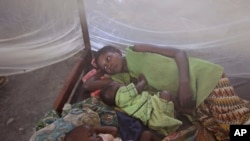Protecting young children from malaria in countries where the mosquito-borne illness is endemic can include preventive drug treatment during the rainy season, when most infections occur. Now, researchers report that delivering an anti-malaria drug monthly, all year long, dramatically reduces the risk of this potentially lethal disease in infants and toddlers.
Ninety percent of the 219 million malaria cases each year occur in sub-Saharan Africa, where most of the disease's 660,000 fatalities are children. Infants and toddlers are at risk for the worst type of malaria, known as cerebral malaria, as well as life-threatening anemia and respiratory distress.
Insecticide-treated bed nets have been the mainstay of prevention. But health care providers soon may be including a monthly dose of the artemisinin-derived drug known as DP (dihydroartemisinin-piperaquine) in their arsenal to protect malaria’s tiniest victims, children between the ages of six and 24 months.
In a new study involving almost 400 children from Uganda, an international team of researchers discovered that a monthly dose of DP, given to babies and toddlers, reduced the risk of parasitic infection by 58 percent, compared to children who received no treatment. Two other study drugs worked, but not as well.
The trial took place in an area where the risk of infection is a year-round concern.
Lynne Mofenson is chief of the Maternal and Pediatric Infectious Disease Branch at the U.S. National Institutes of Health, which helped fund the study.
“I think the main message here is that prevention is better than waiting until the child gets sick and dies. And that - in the absence of a vaccine and in areas with high rates of resistance - this kind of intervention that the folks studied is important to consider," said Mofenson.
The malaria parasite has developed resistance to the two less effective study drugs, say experts, and there had been concern that regular, preventive treatments could render other drugs ineffective.
But that did not happen as researchers sought to weigh the benefits of year-round treatment to the risks of anemia and other drug side effects.
Investigators stopped administering DP and the other drugs at 24 months, following the children through age three. At that age, Mofenson says, most young children develop some immunity to malaria.
“The kids still get malaria, but it is not the severe kind of malaria that causes death that is seen in young infants," said Mofenson.
Mofenson says researchers found the infants and toddlers who were given drugs preventatively each month had the same risk of malaria infection as other kids, indicating that the treatment had not compromised their immune response.
The findings were published online in the open access journal PLOS Medicine.




